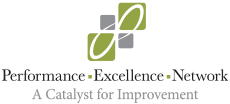
What Excellence Looks Like in Today’s World: Insights from PENworks 2020 – Oct 2020
October 28, 2020
Winning is relative. The Dodgers just won the World Series: they didn’t need to be better than then 1906 Cubs (which had a .763 winning percentage, the best of all time), but just better than the Tampa Bay Rays in a seven-game series.
What defines success is based on circumstances: what’s considered achieving excellence in 1986 is obviously very different than what’s considered achieving excellence in 2020, with advances in technology, management techniques, and so forth. And achieving excellence in 2020 is different than achieving excellence than just last year – in a pre-pandemic 2019 – which is why it’s important to define the context when evaluating performance.
For example, if this year your organization’s revenue is down 30-35%, you as a leader may be disappointed – historically, those are terrible results. But it would help to know whether your industry is down 10-20% or 40-50% to judge your relative performance. Comparative data gives you some perspective – a relative baseline from which to judge your results.
Having said all of that, 2020 is an outlier for most of us. We’ve never had a year quite like it, and there may not be a year quite like it again (let’s hope not!) – the pandemic, the resulting economic crisis, the unpredictable and accelerating pace of change, the tension and civil unrest due to racial inequities, and the political polarization which no doubt will reach a milestone during next week’s election. Putting your performance in the context of what’s going on around us is critical: it leads to better planning, decision making, resource allocation, change management (and, quite frankly, professional sanity).

So I would encourage you all as leaders to find comparative data, especially these days: when it may feel like your organization’s performance is deteriorating, knowing how your results compare to meaningful external benchmarks brings you perspective.
It is in that context that the rest of my column this month features leaders from world class organizations – those organizations who have demonstrated high performance during “normal” times, so have a better chance of navigating today’s challenging times. (After all, many of them are struggling too, just struggling less than the average organization.)
PEN hosted our annual conference last month with the theme of MISSION POSSIBLE: Positive Change in Challenging Times. The online event featured more than 20 speakers, each sharing insights, methods, tools, best practices to help organizations and communities navigate today’s reality. Some of the insights work in any time, but some of them have emerged as a result of today’s challenges. I’d like to share a few of them in the form of thoughtful considerations.
Below are 64 insights, shared by six conference keynotes – four of which achieved world class performance and were recognized with the Malcolm Baldrige National Quality Award, and the other two (Cindra Kamphoff and Gophers Football head coach PJ Fleck) were more focused on creating high performance within your teams. Maybe read one insight a day – a daily reflection that you (and your team) discuss, exploring what it means to you as individual leaders and contributors, but also what it means to you as a team or an organization.
And if you missed the conference but would like to hear any of them, we’ve packaged the conference into a video on-demand series! You can purchase and download all of PENworks 2020 for $250 ($125 for PEN members – inquire for your promo code!). Or you can view separate talks “ala carte” for $40 each ($20 for PEN members). Shameless plug, yes, but these sessions are high impact, high energy, and high value – and they have a shelf life that will help us all navigate today’s challenges.
The PENworks 2020 conference on-demand series is here.
So reflect on these insights, and my best wishes for a (relatively) successful rest of 2020, and a much better 2021…
Insights from Cindra Kamphoff, opening keynote of PENworks 2020
“Your mindset is your engine – it powers every single thing that you do: your decisions, your actions as a leader. Your mindset helps you thrive, not just survive.”
“Your brain is wired to keep you safe, not to be a peak performer. We inherently have a negativity bias, so we must train our mind every single day [to stay positive, remain effective].”
“We shouldn’t try to eliminate fear – it keeps us safe. But if we’re overwhelmed by it, it prevents us from being a great leader.”
“I kept my head where it belonged – focused on every opportunity that was given to me. Rather than focusing on all the things that I can’t control – variables that will change whether I want them to or not – I have to keep my mind focused on what I can control.” Minnesota Vikings Adam Thielen, through Cindra Kamphoff
“Your best self is the one at the other end of that trail of grit. If you never stop searching for what makes you the best version of yourself, you’ll take off beyond boundaries you never even knew were there.” Adam Thielen, through Cindra Kamphoff

“There are four ways to gain the edge based on research within performance psychology: Grow your grit, Remember your purpose, Initiate your morning, Talk to yourself powerfully.”
The number one predictor of success is grit. “Grit means having passion, purpose, and perseverance towards your long-term goals.” Angela Duckworth through Cindra Kamphoff
“You need a short-term memory of your mistakes and a long-term memory of your successes.”
“If you are struggling to preserver, find your own purpose by asking three questions: 1) why am I still here; 2) what difference am I making in the world; 3) why do I do what I do?”
“Your purpose is essential to your health, your happiness, and your well-being.”
“Every morning for at least one minute, reflect on those things for which you are grateful – research shows that it increases happiness, reduces procrastination, boosts confidence, and you improve your overall performance.”
“To succeed every day, spend one minute reflecting on gratitude, remembering your personal “why” (your purpose), committing to being intentional, and positive self-talk.”
“To overcome our natural negativity bias, hold your positive events in your awareness for a dozen or more seconds to move them from short-term memory to long-term memory.”
“[To succeed], clear your mind more often – get back to the present and stay focused. We’re always focused on something, but is it something that will serve you?”
“There are only two ways to live your life. One is is as though nothing is a miracle; the other is as though everything is a miracle.” Albert Einstein through Cindra Kamphoff
“Being brave, for me, means not giving up on the things that make me feel alive.” Gabrielle “Gabe” Grunewald, Olympic marathon runner through Cindra Kamphoff
Insights from PJ Fleck, head coach of the MN Football Gophers and plenary keynote of PENworks 2020
“Change requires truthful listening.”
“There are a lot of challenges, but there are no problems in this world – only situations that create opportunity.”
“Change is inevitable; change is hard. But change is necessary for growth. And you have to pay the price of change at some point – either proactively or reactively.”
“To change, you have to be better for longer – it’s about persistence, sustainability, stamina.”

“It’s healthy to have pressure, not stress. Pressure is what you can control; stress is what you cannot control.”
“Never throughout history has a person who lived a life of ease left a name worth remembering.” Theodore Roosevelt through PJ Fleck
“You get to pick between the harder right, or the easier wrong.” The Army Cadet Prayer through PJ Fleck
“Every single day there are challenges, there are obstacles, there are situations – but there are no problems and there is no bad.”
“Find a way to live a life that everyone’s going to remember. I’m a huge Hamilton fan: who’s going to tell your story when you’re gone, because when you’re gone you can’t tell your story anymore.”
“Culture starts with leadership…and leadership starts with serving – doing things for other people.”
“Servant leaders do three things: they Listen (with your ears & your eyes – observing), they Look (around corners, are visionary), and they Lift (to be the best they can possibly be).”
“Good leaders ask four questions to make better decisions: who’s going to be mad? Who’s going to be glad? How glad are they going to be? How glad are they going to be?”
“Organizational culture is based on trust, and trust is based on time, consistency, and proof.”
“We label the things that happen to us as “good” or “bad.” But we should have the perspective that everything that happens to us is part of the education – it’s part of the story, it’s part of the journey.”
“To succeed, you need the right people and the right vision.”
“Success requires energy – passion, purpose, commitment.”
“You want to get more out of your life? Serve and give. Having a tough 2020? Serve and give.”
“When you row a boat, your back’s to the future – none of us knows what’s going to happen. We row in the present, which is the only thing we can control. Keep rowing, no matter what the seas are doing.”
“Most people don’t want to change when times are great, but that’s exactly when you should make a change to prepare for a better future.”
“How you do one thing is how you do everything.” [Excellence leads to more excellence.]
“The better organizations define failing as growth. Failure is quit. You get to decide.”
Insights from Mara Bryant, Operations Executive, Adventist White Memorial (2019 Baldrige Winner), Los Angeles
“If you want to build a ship, don’t drum up people to collect wood and don’t assign them tasks and work, but rather teach them to long for the immensity of the sea.” Antoine de Saint-Exupery through Mara Bryant
“To innovate, you need to create an environment where failure is ok.”
“Our success is attributed to the partnerships we’ve built – we accomplish much more through others than just ourselves.”
“To keep your team engaged and morale high, you have to find a way to keep connected. It may be different for different organizations, but the team must feel part of a team, even if you’re currently separated.”
“To truly engage your team, you must capture their hearts – leaders should connect with mission and purpose.”
“During times of crisis, “continuity” of operations does not mean doing things the same, but adjusting so that that same services can be provided in different ways.”
“Success – especially during challenging times – is the result of disciple, agility, and innovation.”
Brian Collins, Executive Director, Illinois Municipal Retirement Fund (IMRF) (2019 Baldrige Winner), Chicago
“To promote alignment, every decision within an organization should somehow tie back to its mission, vision, and values.”
“To navigate a crisis, you need to plan for every scenario, revise and improve technology and communication processes, and refocus on our people.”
“You can’t build your system during a crisis. You need to rely on the processes, the structure, the systems you’ve built during “normal” times. But you also need to invest the time in building those systems when you can.”
“Systems should not be constraining, but actually enabling: they should facilitate innovation, agility, and resilience.”
“You can’t plan for every type of crisis, but it’s in the process of planning that you can prepare for every type of crisis.”
“Fact-based organizations are the most successful.”
“Achieving excellence is a marathon, not a sprint – it does take time, study, reflection, resilience.”
“One of the most critical things leaders can do during crisis is be calm – be anchored by your organization’s processes, systems, values – but be agile to course-correct when necessary.”
Brian Dieter, president & CEO, Mary Greeley Medical Center (2019 Baldrige Winner), Ames, Iowa
“High performance organizations set ambitious goals. Our goal is to be the best, so even after we achieved excellence, we’re not finished with our journey.”
“To achieve excellence, we use the phrase: wherever you are, elevate.”
“Every employee in every organization should have two roles: do the work, and improve the work.”
“If you’re looking to accelerate your organization’s improvement, get outside of your organization, outside of your industry to learn from others.”
“To achieve excellence, focus on a few key goals, measure and review performance against those goals, and empower your employees to take action toward those goals.”
“Our biggest driver of excellence is engaging our staff. You cannot have an effective team without an engaged team.”
“The people closest to the work must be engaged and empowered to solve problems within the work.”
“Effective communication goes both ways: you must listen – and actually hear – as well as share key messages.”
Dr. Mecca Salahuddin, Director of Strategic Initiatives and Performance Excellence, Alamo Colleges District (2018 Baldrige Winner), San Antonio
“To achieve excellence, organizations need both structure and agility.”
“To improve alignment, you must think about the whole first before thinking about the individual parts of a system.”
“During crisis, you must move with more speed than precision. Adjust, study, learn, and readjust.”
“We have leaders in every seat: success is the result of giving your people permission, and then empowering them to succeed.”
******
I’ll close with one final quote, which doesn’t come from any of our PENworks 2020 conference speakers, but was mentioned by JoAnn Sternke – one of our breakout speakers, and a world class educator and leader herself. She facilitated a panel discussion featuring the four leaders from Baldrige recipient organizations, and in so doing led off with this powerful quote:
“Leading is about guiding people into the future, despite its risks and uncertainties,” a comment made by Linda Ginzel of the University of Chicago’s Booth School of Business.
Effective leadership during “normal” times is one thing, but leading today requires a much greater level of authenticity, transparency, and empathy. And leaders must first take care of themselves before taking care of their people.

If you’re interested in professional and personal self-care, consider attending PEN’s Nov 17 “Resilience Retreat,” featuring seven leading experts on managing stress, reducing conflict/toxicity, and improving resilience. More information here.
If you’re interested in PENworks 2020 on demand, visit here.
What other insights/tips do you have regarding how to achieve “excellence” during tough times? Participate in a discussion on this topic: visit our LinkedIn group to post a comment. And follow me on Twitter @LassiterBrian!
Stay healthy and never stop improving!
Brian S. Lassiter
President, Performance Excellence Network
www.performanceexcellencenetwork.orgCatalyst for Success Since 1987!

